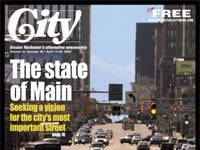[
{
"name": "500x250 Ad",
"insertPoint": "5",
"component": "15667920",
"parentWrapperClass": "",
"requiredCountToDisplay": "1"
}
]
Just after Abraham Lincoln was killed in Washington in April 1865, Secretary of War Edwin Stanton said the famous words, "Now he belongs to the ages." Lincoln's birthday became a national day of commemoration, and he became an icon for Americans of all races and ethnicities. Stanton faded away, though his defense of Reconstruction, which if carried through might have prevented a century of Jim Crow, and attacks on War Department waste and corruption spoke to the future, too.
Now we're observing the life and death of another assassinated national leader whose story intersects America's "color line." But Martin Luther King, born in January 1929 and killed in April 1968, has not yet won suitable recognition as a man for "the ages." Rather, he's been largely ghettoized as an African-American hero, not a universal one, and the full breadth of his work is too little appreciated.
Dr. King, it's often said, has become a plaster saint: no flesh, blood, or radical thoughts. The word "dream" recoils on him, making him sound vague, merely evocative.
But the famous 1963 "I Have a Dream" speech in Washington also had guts, and it remains current. In that speech, King said America "has given the Negro people a bad check... which has come back marked 'insufficient funds.'" Echoing Frederick Douglass's reference to the "awful roar" of oceanic change, he foresaw that "whirlwinds of revolt" would shake America's foundations.
There was a flip side, too. In his Gandhian advice to anti-racist movements, King told us we must "[meet] physical force with soul force."
But it was in his "Beyond Vietnam" speech of April 4, 1967, that King brought these points home most forcefully. And most sweepingly: He announced to his audience, for example, that he was a "citizen of the world" testifying "against the path" his nation had taken.
Delivered in New York City's Riverside Church, the speech is definitive evidence of King's transformation into a political radical, a man who said what Americans needed to hear. The occasion was a meeting of a group King supported: Clergy and Laymen Concerned About Vietnam, which would continue as a social-justice organization under the name Clergy and Laity Concerned. (Disclosure: The writer was a longtime coordinator of the Rochester CALC chapter, the Peace and Justice Education Center.)
Though the speech was naturally about Southeast Asia, it fits the War on Terror like a glove. "Somehow this madness must cease," King thundered. The war, he said, was exacting a "double price," "smashed hopes at home and death and corruption" abroad. America's aggression against Vietnam, he said, "is but a symptom of a far deeper malady." He predicted that, without a basic political transformation, the US would move from war to war, and "we will find ourselves organizing 'clergy and laymen concerned' committees for the next generation."
The nation must begin a "revolution of values," he said. "When machines and computers, profit motives and property rights are considered more important than people, the giant triplets of racism, extreme materialism, and militarism are incapable of being conquered."
He argued for economic justice and redistribution, as well: "[T]he whole Jericho Road must be transformed so that men and women will not be constantly beaten and robbed as they make their journey on life's highway... [A]n edifice which produces beggars needs restructuring... A nation that continues year after year to spend more money on military defense than on programs of social uplift is approaching spiritual death."
The speech contains treasures beyond description, and it pays to look at the entire 7,000-plus-word text. And like the better known "I Have a Dream" speech, "Beyond Vietnam" deserves to be disseminated as widely as possible. But there are barriers to wider distribution --- not just doctrinal ones, that is, the usual intellectual blinders that American institutions wear.
There actually are struggles over Dr. King as a brand name and cash cow. King's legacy is still far from the public domain. We found this out the direct way when we tried to publish longer extracts form the "Beyond Vietnam" speech so King's oratorical power would jump off the page.
Our story began with a visit to the definitive source for the "Beyond Vietnam" speech and other King documents: Stanford University's Martin Luther King, Jr., Papers Project. Founded in cooperation with Mrs. Coretta Scott King and the Atlanta-based King Center and King Estate, the Project is compiling a 14-volume edition of King's papers for research purposes (at $50 per volume). The Project also maintains an extensive on-line library of King documents (www.stanford.edu/group/King/).
When we opened the Project's portable document file of "Beyond Vietnam," we encountered some electronic barriers. Regina Covington, a one-time Rochester resident, confirms they're in place. "We have [the speech] on our site, but you can't download it or copy it" because of permission restrictions, she says. As Covington explains, users who want to do more than read a text must detour to the King Estate's Intellectual Properties Management office, which jealously controls the copyrights.
We e-mailed and faxed "IPM" for permission to reprint several paragraphs of "Beyond Vietnam," but the office did not respond by press time. We also reached King Center spokesperson Robert Vickers by phone. He declined to speak to us, asking that we submit questions by fax. We did so but received no response.
Covington tells us that this is a busy season for the King Center; and so it must be, with King commemorations occurring all over the map, and requests of all sorts pouring in. Still, over the last few years the King Center has drawn ample criticism --- from sources across the political spectrum --- for its handling of the legacy.
In 2002, for example, Forbes magazine ran a piece accusing the Center of "minting a fortune" from the licensing of King's image and speeches. The accusation referred to some wheeling and dealing in Washington. The King Center had asked the Library of Congress to pay $20 million for a collection of King documents, and a bill was introduced in Congress to authorize the minting of a King commemorative coin to raise the money. (The bill was reincarnated last year and still sits in committee.)
The Center also made headlines a few years ago for suing CBS over the latter's use of the "Dream" speech without permission. After some to-and-fro in the courts, the matter was settled in summer 2000, with CBS agreeing to make a donation to the Center.
In 2001, conservative Black columnist Armstrong Williams took on the Center for letting Alcatel Communications use a clip of the "Dream" speech in a TV commercial. Williams charged there's "a certain brutality to using a civil rights leader's image to hawk merchandise." Similarly, in 1999 leftist Black commentator Manning Marable told CNN: "It's unfortunate that the King family has devoted its life and livelihood to the commodification of the image of Martin."
Then there are corporate partnerships that have made heads turn. For M.L. King Day 2003, the Center announced the entire "I Have a Dream" speech was being offered "free to the public" --- "at participating 7-Eleven® stores while supplies last." Last November, the Center said it had "accepted a $1.2 million check" from the Denny's restaurant chain. The money, collected from sales of Denny's "All-American Slams"®, will fund the Center's "nationwide community service initiative. And this month, the Center chose two honorees for their work "toward building the 'Beloved Community,'" U2 lead singer Bono --- and Target Corporation, the latter in part for its philanthropic activities.
On the other hand, said CNN in 1999, the Center, though it carries its own line of King merchandise, has "fought off attempts to market King's image on everything from refrigerator magnets and plastic statues to switchblade knives."
As the business plan unfolds, the dream of economic progress is unrealized.
For example, "Black-White gaps" are still wide, and some gaps are still widening, says a new report from a Boston-based group, United for a Fair Economy. In 1968, says the report, the "typical Black family had 60 percent as much income as a White family." But by 2002, says the report, the figure had declined to 58 percent.
Today "one in nine African-Americans cannot find a job," says the report. "Black unemployment is more than twice the White rate, a wider gap than in 1972."
The report does foresee progress --- of a sort. It notes the black-white poverty gap has narrowed (though in 2002, "the Black poverty rate was three times greater than the White poverty rate"). The kicker is the pace of improvement. "At the slow rate that the Black-White poverty gap has been narrowing since 1968," says the report, "it would take 150 years to close."
So it turns out the economic vision in "Beyond Vietnam" is of a distant beyond, indeed.
And King's 1967 vision of peace? With the nation's leaders issuing explicit calls for endless war and imperial extension, and cutting budgets while financing a Pentagon bonanza, the slain leader might say the nation is no longer approaching spiritual death, but has arrived.
Latest in News
More by Jack Bradigan Spula
-

The state of Main
Apr 14, 2004 -
School improvement: the price is wrought
Apr 7, 2004 -
Hour of power
Mar 31, 2004 - More »





